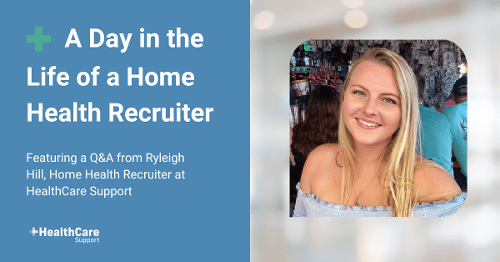A Day in the Life of a Home Health Recruiter

A Day in the Life of a Home Health Recruiter
Home health recruiters play a critical role within the healthcare system, acting as the essential link between talented nurses and the facilities that rely on them to deliver exceptional patient care. These professionals are responsible for identifying, hiring and supporting nurses, ensuring that your facility receives the highest caliber of healthcare talent. They manage a wide range of tasks, from conducting thorough interviews to maintaining strong relationships with both clients and nurses, going above and beyond to meet the unique needs of your organization.
In this Q&A, we dive into the daily responsibilities of HealthCare Support (HCS) home health recruiter, Ryleigh, who provides invaluable support to healthcare facilities by navigating the unique challenges and ensuring the placement of top-tier nursing talent in positions where they can truly make a difference.
Q&A With A Home Health Recruiter
Q: What would you say is the most rewarding thing about being a home health recruiter?
A: I would say, honestly, connecting with the nurses who make such an impact in our community and assisting the community further by placing these nurses with people who really need hands-on care. The relationships and connections I build with the community and the nurses are incredibly rewarding.
Q: What is something unexpected that you handle or manage for your travelers that most people wouldn’t think a recruiter does?
A: There are a few nurses I’ve worked with for a few years. Doing local and contract nursing, there have been people I’ve worked with for just one assignment and others since 2022. Keeping those relationships strong is key. Sometimes, I give candidates my personal phone number if I’m going on vacation and they have payroll questions. My company doesn’t assist with housing for our travelers, so if a candidate requests, I will send them individual housing options based on their preferences. I also check in with my candidates periodically to ensure they’re having a good time on their assignments.
Q: Is there anything else unexpected that you handle for them?
A: Honestly, it’s pretty baseline. I’m not sure what the general understanding is of a recruiter’s role, but I strive to be as helpful and supportive as possible.
Q: What’s the most interesting thing you’ve seen while working with home health travelers?
A: Nothing has really come out of left field, except for the unfortunate instance of a candidate passing away. In terms of interesting experiences, pairing travelers together can be quite unique. Finding locations for travel pairs with home health can be challenging but rewarding. For example, I have a therapy travel group in Washington right now that’s a husband-and-wife team. It’s pretty cool to help people travel together.
Q: That sounds interesting. Do you have any tips for home health or travel nurse recruiters just starting out?
A: For home health specifically, it’s such a niche field compared to acute or outpatient settings. I recommend connecting with the nurses and learning as much as you can about what they do day-to-day. When you’re recruiting, nurses will have specific questions about their roles. Being knowledgeable and dependable is crucial. Learn what a home health nurse does daily and be prepared to provide accurate answers.
Q: I’m sure no home health nurse would want to ask a question and not get an answer. As a recruiter, you probably do a lot of research to provide that information.
A: Absolutely. Home health nurses aren’t just clocking in and out at a facility; they’re traveling to multiple patients’ houses daily. They have many questions about specific coverage areas, company policies, mileage reimbursement, and more. Being familiar with the clients you work with helps you answer these questions accurately.
Q: Is there a specific story that stands out as funny or interesting that has happened to you or one of your candidates?
A: A funny story is when a nurse I submitted ended up interviewing with someone she went to high school with, who would have been her manager. That was quite unexpected.
Q: Is there anything heartwarming that you would like to share?
A: Absolutely. I often get thank yous from my candidates for being knowledgeable and available when they need me. I also hear from managers about the great job our nurses are doing and how they make a difference in patients’ lives. In home health, nurses sometimes are the only people patients interact with all day. Managers often commend our nurses for their patient care and communication with families, which is heartwarming.
Q: Do you have any advice for new home health travelers?
A: My advice for home health nurses entering the travel field is to ask all the questions. Sometimes recruiters don’t mention certain things intentionally. With home health, coverage areas and mileage reimbursement differ by company, so it’s essential to ask any and all questions. Be comfortable working independently, as it’s just you and the patient. You need to be confident in your clinical skills since you won’t have a colleague to lean on.
Q: That makes sense. It’s just you and the patient.
A: Exactly. In a facility, you can ask someone else for help, but in home health, you’re on your own. So you must be confident and skilled in your clinical abilities.
Partner with HCS for Unmatched Healthcare Talent Solutions
At HCS, we understand that the success of your facility depends on having the right healthcare professionals in place. Our recruiters, like Ryleigh, are dedicated to ensuring that you receive the best possible candidates, streamlining the hiring process and providing continuous support to meet your needs. We are grateful for Ryleigh’s valuable insights and expertise, which highlight the significant impact that our recruiters have on delivering quality care.
For more information on how HCS can be the right partner for your staffing needs, click here.




